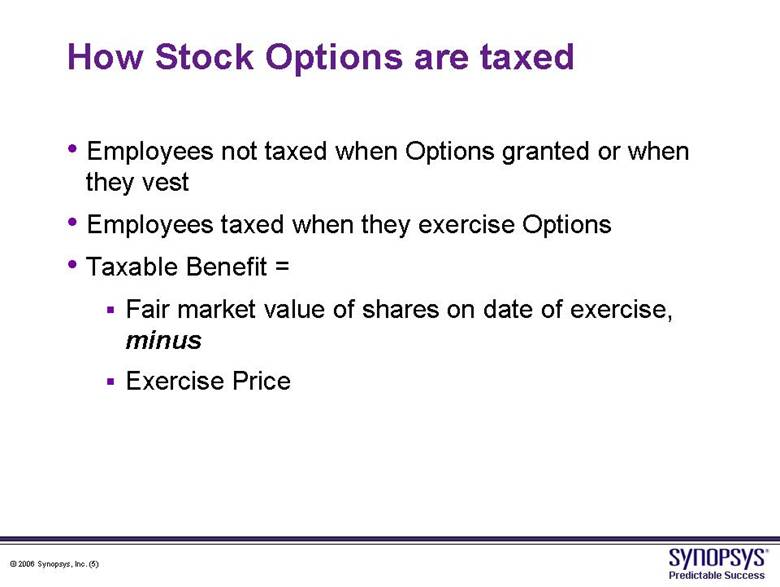When are employee stock options taxable
Home Companies Industry Politics Money Opinion Lounge Multimedia Science Education Sports More Technology Consumer Specials Mint on Sunday.

People Results Management Start-ups Financial Services Manufacturing Retail Telecom Infotech Infrastructure Education World Reports Agriculture Marketinfo Mint 50 Mark to Market Markets Ask Mint Money Calculators Mediclaim Ratings Views Online Views Columns Quick Edit Blogs Lounge Business of Life Slideshows Videos Technology Videos Marketing Research Personal Tech Media Advertising Enterprise Tech Gadgets Tech Reviews Technology Apps Education Health Cricket Athletics FootBall Tennis Olympics Others.
Beyond The Tax Book Gautam Nayak Income Tax ESOP FBT. Beyond the tax book Gautam Nayak. Thu, Nov 03 A according to a recent newspaper report, the Income Tax Appellate Tribunal had held that employee stock option plans Esops are capital assets and that the proceeds from an Esop would be taxable as capital gains.
It further stated that Esops were likely to become more popular as a means of employee compensation on account of the fact that the employee could treat the income from such Esops as capital gains, which are taxed at a lower rate of tax. How far is this correct? The tribunal decision referred to in this report is that of the Delhi bench of the tribunal in the case of Abhiram Seth, an employee of PepsiCo India.
He was given the stock of PepsiCo Inc.
The cost of the shares was to be at the market price. It appears that the options were exercised at that time and shares allotted to the Esop Trust appointed by the company, which held them on behalf of the employee, but no payment was made for the shares by the employee.
Employee Stock Options Explained - Plans, Taxation, Pros & Cons
The shares were subject to a lock-in period of three years and the cost of the shares was to be recovered at the time of sale of the shares. The shares were sold by the employee in February through the Esop Trust and the difference between the sales proceeds and cost was received by the employee through the Esop Trust.
Taxation of Employee Stock Options - NQs and ISOs
The tribunal, therefore, held that the shares were long-term capital assets and the gains on the sale of the shares were taxable as long-term capital gains. When one looks at the facts of this case, the ratio of the tribunal decision does appear justified.
This was really a restricted stock plan—a case of allotment of restricted stock through a trust, which also had a cashless element to it.
Further, the grant was at the market price of the shares.

Therefore, the entire difference received by the employee represented the appreciation of the shares of the allotment of the shares. The tax treatment of employee stock option plans is quite different. This decision cannot therefore be regarded as applicable across the board to all stock remuneration plans, leave alone Esops where the grant of shares is not at market price.
It also needs to be kept in mind that the law has been amended with effect from April Under the amended law for Esops, the difference between the market value of the shares on the date of exercise of the option and the grant price of the shares is taxable as a perquisite, as a part of the salary income, and the subsequent appreciation is taxable as capital gains. Similarly for restricted stock plans, the difference between the market price on the date of allotment and the price payable for the shares is taxable as a perquisite while subsequent appreciation is taxable as a capital gain.
Even today, if the shares are allotted at the market price, the entire appreciation would be attributable to the post allotment period and would, therefore, be taxable as capital gains.
The tax treatment of shadow option plan is, however, quite different.
Here, the employee does not really have the right to receive actual shares of the employer company by exercising the option. A notional purchase is assumed as well as a notional sale and the difference is paid to the employee. The tribunal decision has held that such a difference paid to the employee is really in the nature of a bonus, which is linked to the performance of the stock prices of the company and the entire amount is, therefore, taxable as salary since there is really no actual option to acquire the shares.
From April to March , stock options were taxable, though not in the hands of the employee.
Taxation of Employee Stock Options | Collins Barrow | Chartered Professional Accountants
The employer was liable to pay fringe benefit tax FBT on the value of such stock options, the value being determined by the difference between the market price and the exercise price price at which the shares were allotted to the employee , such difference being determined on the date of vesting of the option.
When the employee sells such shares on which the employer has paid FBT, the market price of the shares on the date of vesting is to be taken as the cost of such shares for the purpose of computing the capital gains on the sale of the shares.
Employee Stock Options: Definitions and Key Concepts
The tax treatment of employee stock remuneration plans, therefore, depends upon the type of plan, its structure and the point of time at which the vesting or exercise of the option has taken place. Home Companies Opinion Industry Politics. Consumer Lounge Multimedia Money Science. Education Sports Specials Technology Mint on Sunday. Contact Us About Us Advertising Sitemap Subscribe.
Taxation of Stock Options for Employees in CanadaMint Apps Shine Hindustantimes Syndication DesiMartini. Privacy Policy Terms of Use Mint Code RSS.